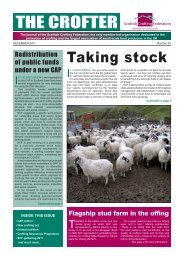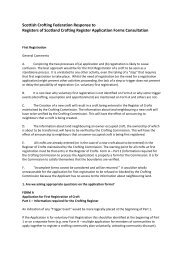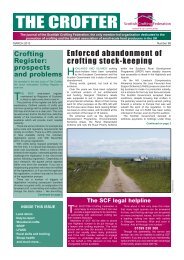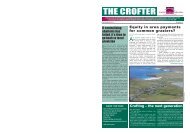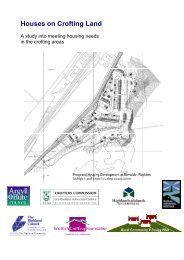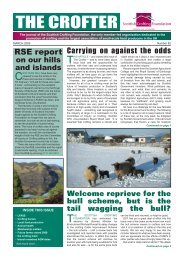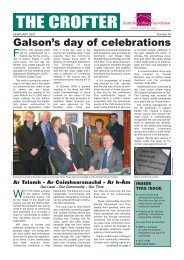THE CROFTER - Scottish Crofting Federation
THE CROFTER - Scottish Crofting Federation
THE CROFTER - Scottish Crofting Federation
Create successful ePaper yourself
Turn your PDF publications into a flip-book with our unique Google optimized e-Paper software.
4<br />
<strong>THE</strong> <strong>CROFTER</strong>, MAY 2010<br />
A productive agricultural sector essential<br />
SCF comments on the<br />
inquiry into future support for<br />
agriculture in Scotland<br />
An inquiry chaired by Brian<br />
Pack, looking at future support to<br />
agriculture in Scotland, released<br />
an interim report on their findings<br />
and went out to consultation<br />
recently. The following is a<br />
summary of the SCF response.<br />
A<br />
N iNTeriM rePorT is<br />
very useful and informative<br />
and we appreciate that<br />
public meetings have been held<br />
to inform producers of the inquiry’s<br />
thoughts to date.<br />
Comments received from our<br />
advisors are on the whole negative<br />
– in fact they cover the range<br />
from being uncomfortable with,<br />
to being extremely hostile to, the<br />
suggestions given by the inquiry<br />
committee, with the mode tending<br />
to the latter.<br />
We agree that there is a need<br />
to change the way support is<br />
delivered to agriculture, food<br />
production, land management<br />
and rural development and that it<br />
should be sooner rather than later.<br />
We should not wait until 2014 to<br />
instigate change. however, the<br />
model suggested in the interim<br />
report is not the way forward.<br />
The report starts well with a<br />
good background into wider issues<br />
and how scotland’s policies have<br />
to address these issues – such as<br />
food security, water management,<br />
energy production, biodiversity<br />
protection, climate change and<br />
so on. rural population retention<br />
is mentioned also. The report<br />
then seems to ignore most of the<br />
background and policy drivers and<br />
addresses only the underlying<br />
purpose of economic growth.<br />
We do not include the word<br />
‘sustainable’ (as in the <strong>Scottish</strong><br />
government principle aim) as we<br />
do not feel that the suggested<br />
model addresses sustainability.<br />
Indeed, we find the proposal that<br />
“it may be that we cannot increase<br />
food production without some sort<br />
of environmental degradation”<br />
completely unacceptable.<br />
We agree that it is essential to<br />
maintain a productive agricultural<br />
sector in scotland – so that we<br />
maintain our capacity to respond<br />
to issues of food security – food<br />
production should therefore<br />
include crops/livestock at present<br />
unsupported, eg pigs, goats,<br />
potatoes, vegetables, soft fruit,<br />
glasshouses/polytunnels.<br />
What about the other securities<br />
that we need to address, such as<br />
carbon sequestration? Food is of<br />
primary importance but agriculture<br />
is not just about food. “european<br />
agriculture is multi-functional,”<br />
says the report, but then appears<br />
to ignore that in the scottish<br />
context. The approach needs to be<br />
more holistic with support directed<br />
at activity that will bring about<br />
desired outcomes such as support<br />
for sustainable food production,<br />
support for carbon management,<br />
support for population maintenance<br />
and so on.<br />
“For whoever has, to him shall<br />
more be given; and whoever<br />
does not have, even what he has<br />
shall be taken away from him.”<br />
Mark 4:25. The whole argument<br />
of paying more to those with the<br />
highest ability to produce for the<br />
market is weak. This simplistic<br />
model is highly inequitable and<br />
will not lead to the objectives we<br />
should be seeking for scottish<br />
agriculture. There is no justification<br />
for providing unfettered support<br />
at the highest rates to those with<br />
the most advantage to earn a fair<br />
wage from the market.<br />
We think that it is not going to<br />
be acceptable to the public that<br />
those with the best quality land<br />
and therefore the best ability to<br />
operate in the market receive<br />
the highest support from the<br />
public purse regardless of how<br />
their practices driven by wealth<br />
creation impact on the public<br />
heritage, whilst those managing<br />
huge areas of some of scotland’s<br />
finest landscape and biggest<br />
carbon deposits in a sustainable<br />
manner are supported the least.<br />
it should be recognised in the<br />
context of sustainable economic<br />
growth that tourism brings in<br />
more revenue to the scottish<br />
economy than meat exports<br />
do and it is landscapes such<br />
as those managed by crofters<br />
that tourists come to see. it is<br />
therefore apparent that support to<br />
extensive grazing in the highland<br />
and islands should be given a<br />
higher degree of importance.<br />
but food production isn’t driven<br />
just by economic growth, as the<br />
report correctly observes, though<br />
the many facets of agriculture that<br />
provide the rationale for support<br />
are not reflected in the position<br />
taken in the recommendations.<br />
our principal objections to the<br />
suggested model are therefore<br />
twofold: 1. that it is not placed<br />
in, and does not pay account<br />
to, the wider context of carbon<br />
sequestration, environmental<br />
protection, animal welfare, rural<br />
population well-being... and 2. that<br />
it protracts the unacceptable and<br />
fundamental inequity of basing<br />
levels of public support on quality<br />
of land regardless of the level of<br />
public goods produced.<br />
in the wider scottish legislation<br />
context, this support reform should<br />
be used as the opportunity to<br />
complement the <strong>Crofting</strong> reform<br />
bill, proposed legislation that<br />
increases regulation but relies<br />
on other policy mechanisms to<br />
provide the incentives to croft.<br />
support should be tailored to<br />
scotland’s diverse agricultural<br />
sectors and should recognise the<br />
differences. We have said before<br />
and will keep on saying that ‘one<br />
size does not fit all’. <strong>Crofting</strong> is not<br />
farming, it is a land-based culture<br />
that manages a vast area of some<br />
of scotland’s remotest and most<br />
ecologically fragile landscape.<br />
<strong>Crofting</strong> has kept people in<br />
these areas and if crofting goes<br />
so will the many support ancillary<br />
industries which help communities<br />
to survive; so populations will<br />
decline further. We believe that<br />
the loss of stock from crofting<br />
areas is close to, or has reached<br />
the tipping point, beyond which it<br />
will take generations to recover.<br />
it is therefore imperative that<br />
action to stop the decline is<br />
taken immediately.<br />
land management practices<br />
are crucial to the well-being of<br />
rural scotland and we would like<br />
to see this reflected in support.<br />
For example, it would make sense<br />
to have the number of people<br />
engaged in land management<br />
recognised, not just the area,<br />
otherwise this accelerates the<br />
loss of farming/crofting people<br />
and encourages low-populated<br />
monocultures, consequential<br />
soil degradation and loss of<br />
biodiversity.<br />
We also suggest a component<br />
which directs support on the basis<br />
of how much organic matter,<br />
and therefore carbon, the land<br />
contains ie public support paying<br />
for carbon sequestration, a vital<br />
public benefit.<br />
We would also advocate support<br />
for environmentally beneficial<br />
management practices such as<br />
diversity of cropping and the use<br />
of native breeds of livestock on<br />
fragile ground.<br />
The Macaulay lCA system<br />
could be a very useful tool, though<br />
there is no indication that it can<br />
be adapted for use at the level<br />
required. however, assuming it<br />
can be, this is not the whole story<br />
– if support is to be given for the<br />
delivery of public goods then<br />
we need not only land capability<br />
for agriculture to be known but<br />
also land capability for carbon<br />
sequestration and land capability<br />
for bio-diversity.<br />
We agree that support<br />
should be used to mitigate the<br />
disadvantage experienced by<br />
scottish agriculture – 85% of the<br />
land is classed as lFA. but there<br />
is lFA and lFA. As other inquiries<br />
such as the rse hills and islands<br />
inquiry and the shucksmith inquiry<br />
both found, there are very different<br />
levels of disadvantage and the<br />
way scotland uses the lFAss<br />
mechanism is completely contrary<br />
to the spirit of mitigating natural<br />
disadvantage.<br />
We question the need for top up<br />
funds – there is no clear evidence<br />
presented supporting this idea.<br />
if the support schemes are set<br />
up properly why would there be<br />
a need for a TUF? if we want<br />
farmers and crofters to achieve<br />
transformational change in the<br />
industry with support linked to<br />
the adoption of certain practices<br />
to enhance competitiveness and<br />
sustainability, then design the<br />
support schemes to do this. And of<br />
course we find unacceptable the<br />
notion that TUFs might be directed<br />
at individual claimants in proportion<br />
to their direct area payment, based<br />
on the continuation of payments<br />
being allocated on a “whoever<br />
has (good land), to him shall more<br />
(support) be given” basis. Perhaps<br />
it is just that it isn’t explained clearly<br />
enough, but the TUF idea seems<br />
to be either a bit of a bodge or a<br />
means to prolong the inequitable<br />
and unsustainable support regime<br />
that exists now.<br />
We agree that all agriculturally<br />
usable area should be included<br />
but disagree with the stocking<br />
density. There is land that does<br />
benefit from grazing at lower<br />
stocking densities and, because<br />
it delivers outcomes that satisfy<br />
some of the wider objectives,<br />
should qualify for support. This<br />
land is part of scotland’s natural<br />
heritage and to suggest that we<br />
should pretend some of it doesn’t<br />
exist is ludicrous.<br />
livestock units need to take<br />
into account native breeds which<br />
are generally smaller and have a<br />
more beneficial grazing pattern<br />
and so deliver beneficial land<br />
management in marginal areas.<br />
We agree that support is<br />
needed to help the industry to<br />
adapt and improve – the industry<br />
needs to continually improve its<br />
competitiveness and its adoption<br />
of new practices; this may include<br />
returning to practices that were<br />
sustainable before inappropriate<br />
policy drivers distorted them.<br />
The crofting sector should not be<br />
penalised for having, on the whole,<br />
maintained good practice.<br />
The analogy of the most<br />
productive areas being an engine<br />
house is indicative of this whole<br />
concept missing the point of the<br />
rationale for support. There are<br />
other far-reaching objectives being<br />
missed other than the economic<br />
growth model.




